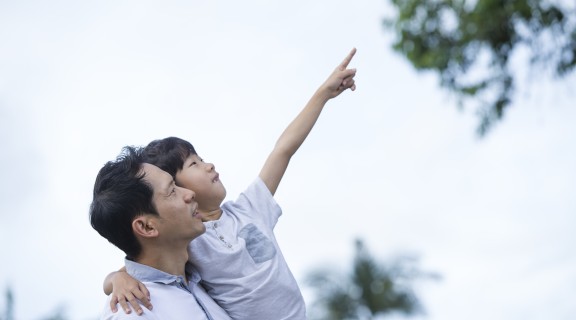
Your child, the storyteller
9 February 2022 | State Library of Queensland
Your four-year-old walks into the room.
“Mum, you need to hear this story.”
For the next five minutes, your child tells you the longest, most descriptive, colourful, action-packed, and amazing tale they can conjure. The words just keep coming and the story gets wilder and wilder.
This is your child, the storyteller - experimenting with words, learning to give meaning to them and creating scenarios to give context. Notice how the story has a beginning, a middle, and an end? They’ve learnt this from you: from the stories you’ve told, conversations you’ve shared, and all the songs and nursery rhymes you’ve sung together.
Listen as the story unravels ... when the truth runs out, your child will make up other details and scenarios and blend them together. When you give your child permission and space to tell ‘pretend’ stories to you, they’ll naturally start to blend their reality with fantasy. This process of making up the story and new words is just as important as the story itself. This is creativity in the making!
When you take the time to really listen, you’ll be amazed by the creativity and enthusiasm that comes with storytelling, with having an audience. You’ll get to see inside your child’s world and experience, and it can be remarkably complex!
Little ears relish and absorb all kinds of stories, whether it be a short tale, poem, song or nursery rhyme. They all have a tone, rhythm, and imagery, which helps your little one to learn new words and understand their meaning.
Storytelling is one of the powerful ways we organise experience, our relationships and our feelings. You can promote storytelling at home by sharing lots of conversations with your child. Talk about the past, the present, and the future; family, events, how you go about your day. Listening to you and participating in the conversation will encourage your child to start telling stories on their own.
Children also love to re-tell stories or anecdotes they hear from other family members. You’ll even notice your child adding in their own words and outcomes to these scenarios. It's their way of solving emotive, cognitive, and social puzzles – and it can be quite entertaining!
Storytelling, learning new words, and organising them into a meaningful context are all foundations for learning to read and write. So, sit back and enjoy the creativity and colour of your child, the storyteller.
To help fuel those little imaginations, here are some ‘wild’ stories you can share:
- Where the Wild Things Are by Maurice Sendak
- We’re Going on a Bear Hunt by Michael Rosen
- Wild by Emily Hughes
- Lost and Found by Oliver Jeffers
Visit your local library to find them. They may also be available as an audiobook, another great way to share stories with your little ones.
Comments
Your email address will not be published.
We welcome relevant, respectful comments.